
The Mount Orne Bridge is a covered bridge over the Connecticut River between Lancaster, New Hampshire, and Lunenburg, Vermont. It joins Elm Street in South Lancaster with River Road in Lunenburg. Built in 1911, it is one of two Howe truss bridges across the Connecticut River. It was listed on the National Register of Historic Places in 1976.
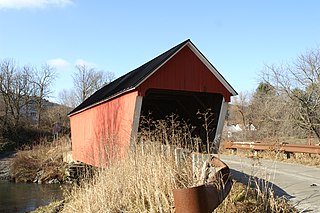
The Gifford Covered Bridge, also called the C.K. Smith Covered Bridge, is a wooden covered bridge that crosses the Second Branch of the White River in Randolph, Vermont on Hyde Road. It was listed on the National Register of Historic Places in 1974. It is one of two bridges in the state that was uncovered when first built, its trusses boxed for shelter.
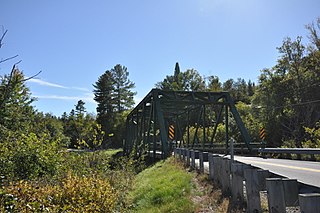
The Bloomfield-Nulhegan River Route 102 Bridge is a historic bridge in Bloomfield, Vermont. It carries Vermont Route 102 over the Nulhegan River, near its mouth at the Connecticut River just south of Bloomfield Village. Built in 1937, it is a well-preserved example of a Pratt through truss, exhibiting then state-of-the-art engineering. It was listed on the National Register of Historic Places in 1991.

The Brookline-Newfane Bridge is a historic bridge spanning the West River between Brookline and Newfane, Vermont on Grassy Brook Road. It is a camelback through truss bridge, built in 1928 by the Berlin Construction Company in the wake of Vermont's devastating 1927 floods. The bridge was listed on the National Register of Historic Places in 2007 as Bridge 19, at which time it was one of seven surviving camelback bridges in the state. It last underwent a major rehabilitation in 2003-4.
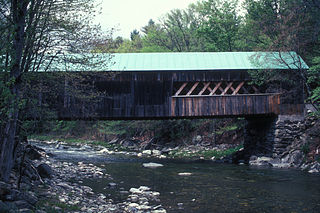
The Williamsville Covered Bridge is a historic covered bridge, carrying Dover Road over the Rock River in Newfane, Vermont. Probably built in the 1870s, this Town lattice truss bridge is probably the oldest covered bridge in Windham County, and is the only one surviving in the town of Newfane. It was listed on the National Register of Historic Places in 1973.

The South Street Bridge is a historic Pratt truss bridge, carrying Vermont Route 31 across the Poultney River just south of the village center of Poultney, Vermont. Built in 1923, it is one of a small number of surviving Pratt through trusses in the state, and one of just three that survives from the period before the state's devastating 1927 floods. It was listed on the National Register of Historic Places in 2009 as Bridge 4.
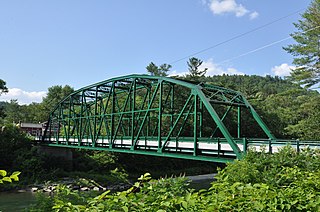
Bridge 15, also known locally as the River Bridge, spans the White River in Sharon, Vermont. Built in 1928, this multi-span Parker truss bridge is one of a shrinking number of White River crossings of this type. It was listed on the National Register of Historic Places in 2008.

The Bridgewater Corners Bridge carries Vermont Route 100A across the Ottauquechee River in the Bridgewater Corners village of Bridgewater, Vermont. It was built in 1928 by the American Bridge Company, following devastating flooding. It is a single-span Pratt through truss structure, and was listed on the National Register of Historic Places in 1992.

The Gould's Mill Bridge is a historic Baltimore through truss bridge, carrying Paddock Street across the Black River in Springfield, Vermont. The bridge was built by the Boston Bridge Works Company in 1929 after major flooding in 1927, and is one of the state's few examples of a Baltimore truss. It was listed on the National Register of Historic Places in 2006.

The Iron Bridge at Howard Hill Road is a modern pony truss bridge, carrying Howard Hill Road across the Black River in southeastern Cavendish, Vermont. It is a replacement for an historic 1890 Pratt through truss bridge, which is now in storage. The historic bridge was listed on the National Register of Historic Places in 1982.

The Lincoln Covered Bridge is a historic covered bridge, just south of U.S. Route 4 in West Woodstock, Vermont. Built in 1877, it is one of the only known examples of a wooden Pratt truss bridge in the United States. It was listed on the National Register of Historic Places in 1973.

Bridge 22, also known as the Creamery Bridge is a historic pony truss bridge, carrying Old Creamery Road across the Waits River in Bradford, Vermont. Built in 1934, it is well-preserved late example of a bridge style then passing out of fashion. It was listed on the National Register of Historic Places in 2010.

The Stockbridge Four Corners Bridge is a steel girder bridge carrying Vermont Route 100 across the White River near the village of Stockbridge Four Corners in Stockbridge, Vermont. The bridge is a 2009 replacement for 1929 Pratt through truss bridge, which was listed on the National Register of Historic Places in 1991. The historic bridge replaced an older covered bridge destroyed by Vermont's devastating 1927 floods.
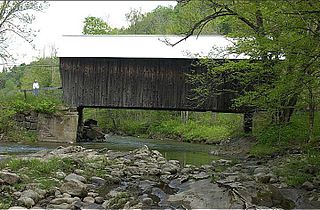
The Moxley Covered Bridge is a historic covered bridge carrying Moxley Road across the First Branch White River in southern Chelsea, Vermont. Built in 1886-87, it is the town's only surviving 19th-century covered bridge. It was listed on the National Register of Historic Places in 1974.
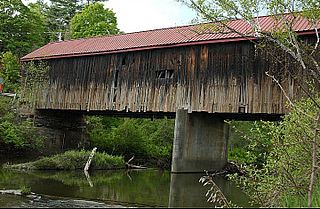
The Thetford Center Covered Bridge is a historic covered bridge, carrying Tucker Hill Road across the Ompompanoosuc River in Thetford, Vermont. It is the state's only known example of the Haupt patent truss system. It was listed on the National Register of Historic Places in 1974.

The Union Village Covered Bridge is a historic covered bridge, carrying Academy Road across the Ompompanoosuc River in Union Village, Thetford, Vermont. Built in 1867, it is the state's longest 19th-century multiple kingpost truss bridge. It was listed on the National Register of Historic Places in 1974.

The Winooski Street Bridge is a historic bridge carrying Winooski Street across the Winooski River between Duxbury and Waterbury, Vermont. Built in 1928, it is a Parker through truss, one of only two of this type on the Winooski River and an increasingly rare bridge type in the state. It was listed on the National Register of Historic Places in 2006 as Bridge 31.

Bridge 9 is a historic Parker through truss bridge, carrying Shawville Road across the Missisquoi River in Sheldon, Vermont. Built in 1928 after Vermont's devastating 1927 floods, it is one of the few surviving Parker truss bridges on the Missisquoi. It was listed on the National Register of Historic Places in 2007.

Bridge 12 is a historic Parker through truss bridge, carrying Boston Post Road across the Missisquoi River in Enosburg, Vermont. Built in 1929 in the wake of Vermont's devastating 1927 floods, it is one a shrinking number of surviving truss bridges on the river. It was listed on the National Register of Historic Places in 2007.

The Railroad Street Bridge is a historic Pratt through truss bridge, carrying Railroad Street across the Lamoille River in Johnson, Vermont. It was built in 1928, after the state's devastating 1927 floods, and is one of its few surviving Pratt through truss bridges. It was listed on the National Register of Historic Places in 2007 as Bridge 6.























